Technical Rope Rescue Level II - Technician
Overview
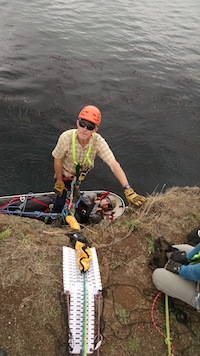
AAI Guide Jim Mediatore works through a complex system with a patient on a cliffside. Jason Martin
The National Fire Protection Association statute 1670 dictates three levels of rope rescue. The first and lowest level is awareness. The second is operations. And the highest level is technician. Rope Rescue Technicians tend to be the individuals who develop rope rescue curriculum for their respective organizations, while also taking the lead in complex rope rescue operations.
The American Alpine Institute Rope Rescue Level II: Technician course picks up where the Operations course leaves off. Participants review operations level techniques (lowers, raises, anchor systems, etc.) while continuing to build on those baseline skills. The course meets the technician standards identified by NFPA 1670 while also addressing the standards set forth in NFPA 1006 and 1983.
Individuals and organizations trained at the NFPA Technician level are capable of:
- Complex hauling systems
- Knot passing techniques
- The proper application and use of high-lines
- A working knowledge of dynamic rope systems
- Rescue team management
Rope Rescue Technician Certificate
Individuals who complete the American Alpine Institute Technician course will receive a certificate of completion for Rope Rescue Level II: Technician.
Rope Rescue Operations
American Alpine Institute Rope Rescue Technician courses are preceded by NFPA compliant Operations Level courses. This course does overlap a little bit with the Operations course, but that is by design to refresh a rescuer's knowledge. It is possible to take both courses back-to-back over a period of seven days. If you would like to take both the Operations and Technician course in a row, please inquire with the American Alpine Institute office.
Technical Rope Rescue Comprehensive
Firefighters and other front-country rescue personnel don't need any training beyond the Technician Level. But those who wish to operate in the mountains may consider additional training.
The American Alpine Institute Technician Course is the second of a 14-day four-part rescue comprehensive series. The Level I Operations Course lays the groundwork. The Level II Technician Course builds on that groundwork. The Self-Rescue for Climbers program adds personal and companion rescue to your skillset. And then finally, the Advanced Mountain Rescue program takes the skills learned in the Operations, Technician, and Self-Rescue courses and builds on them with high-end mountain rescue skills.
A rescuer may choose to take one, two, three or all four parts together. Or the rescuer may choose to break up the courses into bite-sized chunks.
To learn more about the Technical Rope Rescue Comprehensive program, click here.
Technical Rope Rescue Level II - Technician
Details
Since this program is focused on the concept of team rescue, the training scenarios require a group of rescuers to perform all the necessary tasks. So with that in mind, a minimum of 5 students are required to be enrolled in order for this program to run.
A Note about the Operations vs. Technician Level
American Alpine Institute Rope Rescue Technician courses are preceded by NFPA compliant Operations Level courses. If you would like to take both courses in a row, please indicate this on your registration form.
If one were to take our Operations course and Technician course as separate, stand-alone programs, they would be 4 and 5 days long (repsectively). However, we run them in sequence so there is an overlap of two days and the total program length of taking them combined is 7 days:
Operations Course: Days 1 - 4
Technician Course: Days 3 - 7
Inclusions and Exclusions
Included with the tuition are instructors, group equipment (both rescue and climbing), classroom location, permit fees, and transportation to and from field program locations. A live Zoom gear consult is also included.
Excluded are front-country lodging, personal climbing equipment, transportation to the classroom, food, trip insurance, camping equipment, and guide gratuities.
Organizations and Credentials
There are several organizations that oversee rescue standards in the United States. They all have different missions, but many of the core rope rescue components are the same.
Following is a list of the organizations that develop rope rescue standards. AAI's rescue programs align with these organizations and the standards they set fourth.
Mountain Rescue Association (MRA)
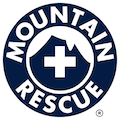
The MRA oversees a patchwork of volunteer and professional rescue teams in the United States and Canada. They develop standards and accredit local mountain rescue units in three disciplines: high-angle rescue, search, and snow.
National Fire Protection Association (NFPA)
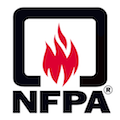
The NFPA is an organization devoted to "eliminating death, injury, property and economic loss due to fire, electrical and related hazards." To do this, the organization develops codes and standards for individuals operating within the fire service. These standards include operating practices for technical rescue teams.
American Mountain Guides Association (AMGA)
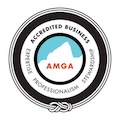
The AMGA oversees technical mountain guides in the United States. The organization credentials instructors and guides, while also accrediting guide services. The AMGA recognizes three disciplines with several levels of certification. The disciplines are Rock, Alpine and Ski. Each discipline has rescue components on which instructors and guides are tested.
International Technical Rescue Association (ITRA)
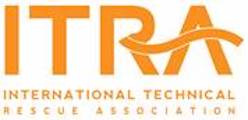
The ITRA is an organization that provides global recognition of technical rescue practitioners and instructors, across a wide range of rescue disciplines, including swiftwater, rope, boat, confined space and animal rescue.
Why should I complete my rescue training with the American Alpine Institute?
There are three primary reasons why you should consider AAI:
1) Experience: All AAI Instructors are also mountain guides with extensive and diverse experience in high-angle terrain. They work with ropes every day and constantly solve new technical problems. Additionally, all AAI rope rescue instructors have technical training from the American Mountain Guides Association.
2) Continuing Education: Members of the AAI Technical Rope Rescue Instructor Team get regular updates and continuing education in technical rescue. These updates come from a wide array of conferences and meetings. One or two Instructor Team members attend a given meeting and then bring what they learn back to the rest of the instructors, as well as to AAI students. The meetings and conferences attended on a regular basis include, but are not limited to, the International Technical Rescue Symposium, the International Commission on Alpine Rescue, the Mountain Rescue Association Annual Meeting, the Wilderness Risk Management Conference, and the American Mountain Guides Association.
3) Commitment to International Standards: The American Alpine Institute is a founding member of the International Technical Rescue Association (ITRA). AAI's programs are overseen by ITRA Level III Instructors, the highest level instructor recognized.